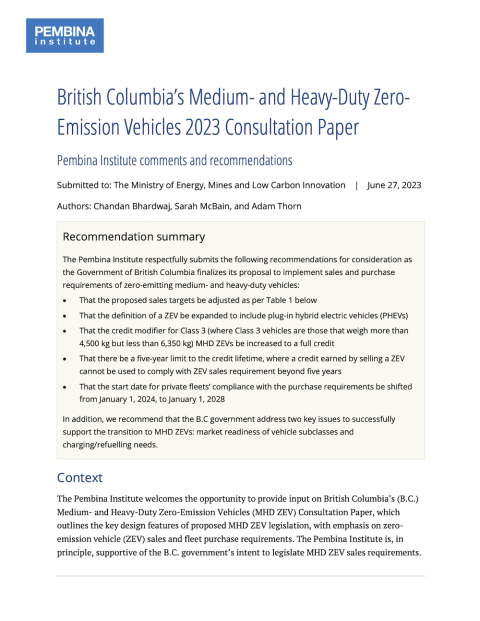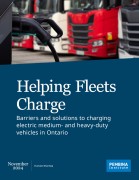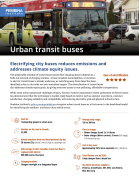The Pembina Institute provided input on British Columbia’s (B.C.) Medium- and Heavy-Duty Zero-Emission Vehicles (MHD ZEV) Consultation Paper, issued in May 2023. The consultation paper outlines the key features of proposed MHD ZEV legislation, with emphasis on zero-emission vehicle (ZEV) sales and fleet purchase requirements.
The Pembina Institute is, in principle, supportive of the B.C. government’s intent to legislate MHD ZEV sales requirements. We also support the government’s proposal to supplement the sales requirements with fleet and stock purchase requirements for public fleets. But it is likely that further consultation will be necessary to determine a realistic deadline for implementing purchase requirements applicable to private fleets. Taken together, though, supply-side sales requirements and demand-side purchase requirements will help create market conditions that are conducive to the swift uptake of ZEVs in the MHD vehicle sector.
At this early stage, however, we have several concerns with the B.C. proposal. First, the differences in market readiness of MHD ZEV subclasses has not been fully taken into account. Additional concerns include overreach in the suggested deadline for purchase requirements as applied to private fleets and failing to adequately address the need for building out charging/refuelling infrastructure concurrently with increased ZEV production.
With respect to market readiness, there is considerable variability among MHDV subclasses. Buses, especially transit and school buses, for instance, are now market-ready to switch to electric fleets. Lighter, medium-duty vehicles (MDVs), such as urban delivery vans, are also market-ready although there are fewer models relative to ZE buses.
On the other hand, commercially viable models of heavy-duty vehicles (HDVs) are scarce. Applying uniform sales targets and deadlines to all subclasses of trucks and buses, as proposed in the consultation paper, does not account for real-world market constraints.
Regarding fleet and stock purchase requirements, private fleet operators will likely find it difficult to comply given that charging infrastructure has yet to be fully built out and grid supply is not (currently) sufficient to support ZEV uptake; the pool of skilled workers to operate, repair and maintain MHD ZEVs is small; and there are few market-ready ZEV options, particularly in the heavy–haul trucking segment.
The Pembina Institute recommends that revisions to the B.C. MHD ZEV policy incorporate a) the variation in market readiness and related constraints that prevent full compliance with purchase requirements; and b) actions that will address charging and refuelling infrastructure-related challenges.
In recognition of the variation in market readiness, the Pembina Institute recommends:
- MHD ZEV sales and fleet purchase requirements that take into consideration the variability in market readiness of different MHD vehicle subclasses, setting more stringent targets for those MHDVs that are readiest to transition to ZEVs, and less stringent targets for vehicle categories where the commercialization of ZEV technologies is a few years away.
- MHD ZEV sales and fleet purchase requirements start date be revised and shift from January 1, 2024, to January 1, 2028, as it applies to private fleets’ compliance. (The Pembina Institute supports the MHD ZEV fleet purchase and stock requirements for provincial and local public agencies starting on January 1, 2026. The issue of compliance with purchase requirements is an area that requires further study and consultation.)
- Capacity-building measures for the production and maintenance of MHD ZEVs, including support for the ZEV supply chain and for skills development within the workforce needed to build and maintain ZEVs.
The Pembina Institute recommends that four sets of policy tools be incorporated to initiate actions that will address charging and refuelling infrastructure-related challenges:
- Financial incentives to encourage increased investment in infrastructure build-out.
- Targets and associated milestones to increase the number of charging and refuelling stations.
- Standardization of protocols and clear responsibilities and roles assigned to utilities to support a well-connected and reliable network.
- Capacity-building initiatives for skills development in the workforce in response to the lack of trained professionals with expertise in building and/or maintaining charging infrastructure.








